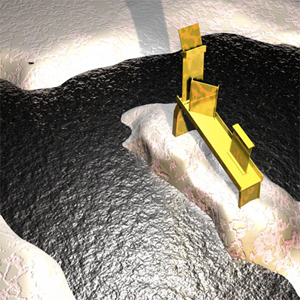Oneohtrix Point Never/Rene Hell Music for Reliquary House/In 1980 I Was a Blue Square
It’s often taxing when an artist so chained to his medium decides to move into […]

It’s often taxing when an artist so chained to his medium decides to move into new territory. For years, Daniel Lopatin’s Oneohtrix Point Never was marked by the sound of his beloved Juno-60, nicknamed “Judy.” With Judy’s apparent breakdown, and an increasing computer-music influence creeping in from his sometime home Editions Mego, Lopatin’s 2011 LP, Replica, was suffused with samples, which he ably manipulated to fit his dystopian palette. Jeff Witscher’s Rene Hell is similarly exploratory, moving from cosmic drone to flirtations with dance music. And, like Lopatin, he made a profound, album-length statement last year in the form of The Terminal Symphony, which effectively fused his spiraling synthetics with modern classical leanings. Noting these likenesses, Vermont’s NNA Tapes has paired the two for a split LP. Neither side is a grand departure from their recent work.
In fact, Lopatin’s side is his recent work. “Music for Reliquary House” is a 22-minute suite assembled from parts of last year’s Reliquary House, composed alongside imagery by video artist Nate Boyce. Hearing it on record, where those vital visuals are foregone, is akin to hearing a soundtrack, in particular one that’s inextricable from its parent film. It’s pleasing enough, but rarely transcendent. There’s an innate feeling throughout that one piece of the puzzle is missing.
At any rate, “Music for Reliquary House” shows how skilled a sample manipulator Lopatin has become, as it’s suffused with the kind of scrambled, endlessly chopped vocals that dotted Replica. They’re subject to a variety of atonal movements, submerged in searing digital noise or left to drift above synthetic choral drones. There are rare snatches of melody throughout, but they’re melodic in the odd way that internet dial-up tones’ splintery, collapsing bells are. As the piece nears its finale, there’s a sense that Lopatin is trying to tie his erratic collage together. His vocal snips start to form words, albeit incoherent ones. At the same time, he works in moments that resemble a string section warming up and an odd glimpse of grunge guitar. Its ultimate ending on an abrupt operatic crescendo is comical—firstly because this grand gesture is so out of place with the rest of the piece, and secondly because it cheekily implies that summating its themes is a foolhardy task. As with Replica, “Music for Reliquary House” overtly comments on telecommunication. The chief result of its stammering, interwoven chatter is disconnectedness.
Witscher’s side, In 1980 I Was a Blue Square, is also based on interruption, though his approach is considerably calmer. “Meta Concrete” finds him pairing an elegiac piano solo with sizzling noise and granular blips. On the string-led “Quelque Terreur,” his synthetics take on the role of tinkling glass, while “Prelude to the Bridge” tangles piano and synth arpeggios, which are intermittently subsumed by fizzing bursts. The serenely floating strings on “Variation in C” are largely devoid of interference, as is the solemn closer “BL, QS.” Compared to The Terminal Symphony, these compositions are more restrained and inward-looking, though they use a similarly limited palette of keys and digital electronics. Witscher’s use of noise bursts throughout is less jarring a concept than it may initially seem, as these tend to amiably gel with his arrangements. His spare keys and sweeping strings are heavily sentimental, and in spite of his attempts to infuse them with chaos, they end up dominating. As a result, the suite can feel overly polite, an attempt to combine classicism and dissonance in which the latter is afraid to offend the former. While it may not live up to its mission statement, In 1980 I Was a Blue Square is composed with a certain meditative grace. Like The Terminal Symphony, it finds Rene Hell becoming an increasingly sophisticated outlet. And if Witscher’s side has any commonality with Lopatin’s, it’s this impetus to evolve his sound into new—if not radically divergent—shapes.

